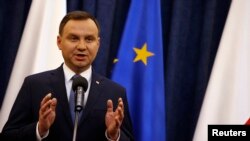The European Commission said on Monday it would examine the impact of laws pushed through by Poland's new right-wing government amid growing concerns for democracy and the rule of law in the EU's largest eastern
member.
Since winning an election last October, the Law and Justice party (PiS), which advocates higher state spending, conservative Catholic values and Euroscepticism, has moved to put Polish public TV and radio broadcasters under direct government control and to change the makeup of the constitutional court.
The court changes prompted public protests, rattled investors and drew accusations from rights activists that PiS is undermining democratic checks and balances in a country long seen as a bulwark of economic and political stability in Europe. PiS strongly denies such charges.
Commission spokesman Margaritis Schinas told a regular news briefing in Brussels that the EU executive would hold a "political debate" on Jan.13 on the rule of law in Poland.
Commissioner Gunther Oettinger, responsible for the digital economy and society, said on Sunday Warsaw should be put under the EU's rule of law supervision, a three-step procedure that could end up with the suspension of Poland's voting rights within the 28-nation bloc.
The rule of law supervision framework was adopted in 2014 to deal with "systemic threats" to EU values. It was created amid concerns over judicial independence in two other former communist member states, Hungary and Romania.
Schinas said the planned discussion of Poland did not amount to a first step in the rule of law procedure.
Under that mechanism, the Commission raises its concerns with the relevant EU member state if it deems there is a systemic threat to the rule of law there. It can give the country a deadline for addressing its concerns.
Should that fail, the EU executive arm can resort to the "nuclear option" of suspending the country's voting rights, a thing that has never happened before.
Fears of creeping 'Orbanisation' in Poland
The latest move from Brussels comes amid growing EU scrutiny of Poland since PiS took over in Warsaw, returning to the helm after turbulent rule in 2005-2007 that ended in acrimony.
Jean Asselborn, foreign minister of Luxembourg, which held the bloc's rotating presidency in the second half of 2015, in December criticised Warsaw's new cabinet, saying it was following the footsteps of Hungary's Viktor Orban.
For all its criticism of Orban, who has long been at loggerheads with the EU over economic policies and democratic freedoms, Brussels has had only modest results in reining in Hungary's ruling Fidesz party.
Some in Brussels are determined not to let the same mistake happen again, which may put the EU capital on a collision course with Poland where PiS leader Jaroslaw Kaczynski has often praised Orban's policies.
The PiS government accuses the opposition, strongly pro-EU centrists it ousted in last year's election, of orchestrating the protests and criticism from Brussels.






